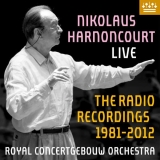Das Concertgebouw Orkest veröffentlicht eine Box mit 15 CDs mit Liveaufnahmen unter der Leitung von Nikolaus Harnoncourt. Etliche Werke aus diesem Programm gibt es in Studioproduktionen bei anderen Labels. Zusammengestellt wurde ein guter Querschnitt durch Harnoncourts Repertoire mit Vokal- und symphonischer Musik.
Die Johannes-Passion fällt nicht aus dem Rahmen dessen, an das uns Harnoncourt in diesem Werk gewöhnt hat. Es ist eine trocken-strenge Interpretation mit stupend dramatischen Choreinlagen und rhetorischen Solisten.
In Haydns ‘Schöpfung’ betont Harnoncourt das Romantische, nicht das Dramatische. Er sucht nach den Stimmungen und Bildern hinter Wort und Ton, er pflegt den Affekt und die Akzentuierungen, die Wärme und die Gutmütigkeit.
Kontrastreich ist Beethovens Missa Solemnis, in der vieles anders ist als bei anderen Dirigenten. Harnoncourt ist kurzatmig, wo man tief Atem holen will, und atmet durch, wo man glaubt, viel weniger Luft zu brauchen. Das Konfliktuelle in Beethovens Musik hat er besonders herausgestrichen.
Dass Harnoncourt nichts übrig hatte für einen graziösen, süß-charmanten Mozart ist gewusst. Das spürt der Hörer auch in den nervig, gespannt, klaren, durchhörbaren Interpretationen, die sich in dieser Sammlung befinde.
Zum Programm gehören auch Schubert Symphonien Nr. 8 und 9 mit detailreichem Musizieren, ungewohnten Akzentuierungen und Kontrasten, die aber den Eindruck eines zutiefst natürlichen Musizierens nicht verdrängen.
Spannungs- und kraftvolle Schumann- und Mendelssohn-Interpretationen stehen zwei Brahms-Symphonien gegenüber, die sehr persönlich, sehr eigenwillig sind, denen es aber an Kohärenz fehlt. Auch Harnoncourts Bruckner ist sehr individuell, fast schon extrem. Was am meisten überrascht, ist die Leichtigkeit, mit der Harnoncourt durch das Werk fegt. Fast oberflächlich, möchte man da anfangs meinen, wenn nicht immer wieder die Suche nach ungewohnten Klangdimensionen auftauchen würde. Aufs Ganze gesehen geht doch ungemein viel vom Typischen in der Musik Bruckners verloren. Oft erscheint uns die Vierte, als käme sie frisch aus einer Hungerkur.
Zu den Höhepunkten der Box zählen die Dvorak-Aufnahmen, weil Dvorak ein Komponist war, mit dem Harnoncourt besonders gut zuwege kam.
Die RCO-Box ist somit eine gute und repräsentative Hommage an den großen Dirigenten.
The Concertgebouw Orkest is releasing a 15-CD box set of live recordings conducted by Nikolaus Harnoncourt. Quite a few works from this program exist in studio productions on other labels. Compiled is a good cross-section of Harnoncourt’s repertoire of vocal and symphonic music.
The St. John Passion does not fall outside the framework of what Harnoncourt has accustomed us to in this work. It is a dryly austere interpretation with stupendously dramatic choral interludes and rhetorical soloists.
In Haydn’s ‘Creation,’ Harnoncourt emphasizes the romantic, not the dramatic. He looks for the moods and images behind words and sound, cultivating affect and accents, warmth and good-naturedness.
Contrasting is Beethoven’s Missa Solemnis in which much is different from other conductors. Harnoncourt is short of breath where you want to take a deep breath, and breathes through where you think you need much less air. He particularly emphasized the conflict in Beethoven’s music.
That Harnoncourt had no love for a graceful, sweetly charming Mozart is well known. The listener also senses this in the nervy, tense, clear, listen-through interpretations found in this collection.
The program also includes Schubert Symphonies Nos. 8 and 9 with richly detailed music-making, unusual accentuations and contrasts, which, however, do not displace the impression of deeply natural music-making.
Tense and powerful Schumann and Mendelssohn interpretations are juxtaposed with two Brahms symphonies that are very personal, very idiosyncratic, but lacking in coherence. Harnoncourt’s Bruckner is also very individual, almost extreme. What is most surprising is the ease with which Harnoncourt sweeps through the work. Almost superficial, one might think at first, if it were not for the constant search for unfamiliar sound dimensions. On the whole, however, a great deal of what is typical in Bruckner’s music is lost. Often the Fourth seems to us as if it had just come out of a starvation diet.
Among the highlights of the box are the Dvorak recordings, because Dvorak was a composer with whom Harnoncourt got along particularly well.
The RCO box is thus a fine and representative tribute to the great conductor.






















